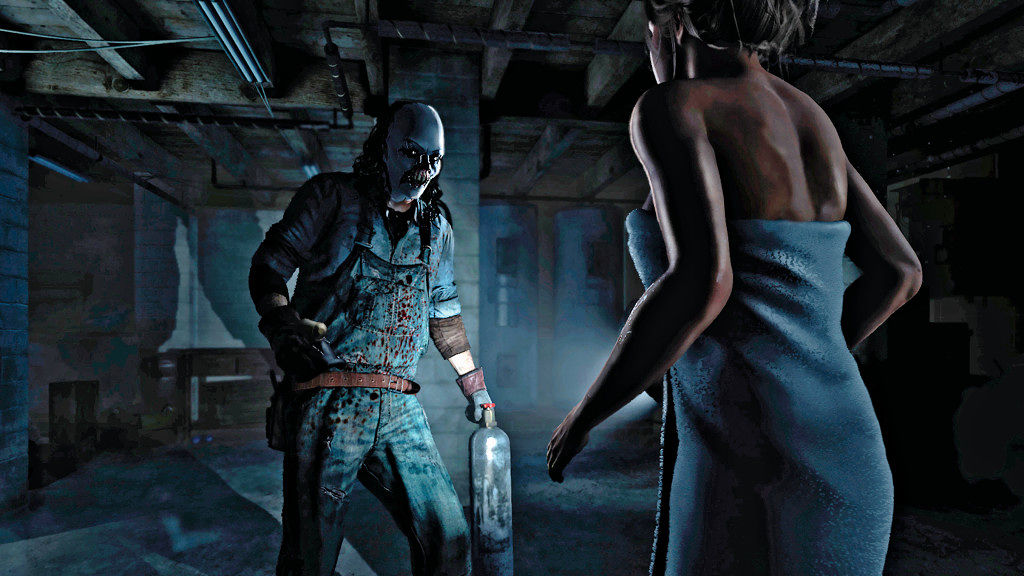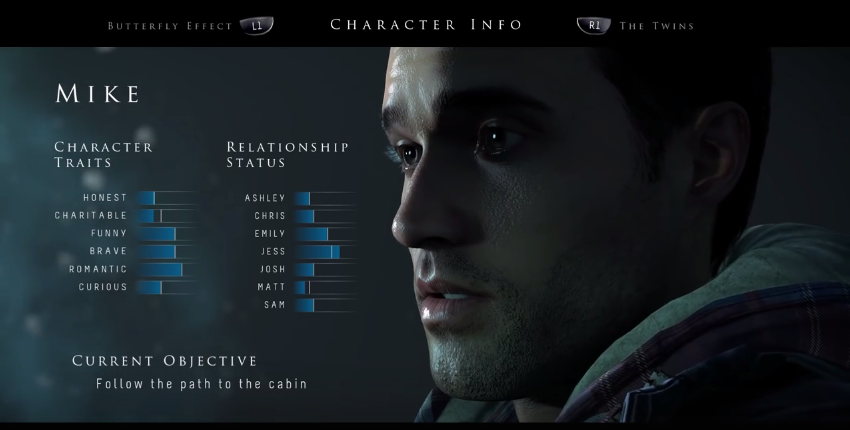(The first half of this article is spoiler-free. The second half contains only light spoilers, but goes into the game’s mechanics in a way that could limit one’s enjoyment. The transition is clearly marked, so if you intend to play Until Dawn, please do not read that section until you are finished)
If you’ve played Heavy Rain, Beyond: Two Souls, Life is Strange, or any of the recent Telltale Games series’, then you have a pretty good idea of what to expect from Until Dawn. Dawn uses the same “Your actions have consequences” framework as its predecessors, and works with the same combination of choice and quicktime events that made most of them enjoyable.
The difference, here, is the genre. Unlike the heavy drama often found in these narrative-choice games, Until Dawn exists wholly within the b-movie slasher-horror realm. All major characters are teenagers (appropriately portrayed by actors and actresses well into their 20s and 30s), the location is a creepy house hidden away from civilization on a mountain (with a series of cabins, mineshafts, and an insane asylum to boot!), and there are tons of cheap scares and red herrings to keep things interesting.
Rather than just being window dressing, the horror trappings embody the game with a completely different feel and identity than other games where your choices “matter.” Unlike serious dramas, in which the audience is compelled to feel for the characters and hope for the best, horror, and especially Until Dawn’s “stupid teenagers” subgenre of horror, often finds pleasure and humor in the suffering of its characters. We watch in dreaded anticipation for the deaths of the characters, but those deaths are, in their own macabre way, the real draw of the material.
The same is true for Until Dawn. The writers do a good job of keeping the characters fairly simple, but giving them enough for you to like or dislike about them. As trivial as their relationship squabbles are in the face of their impending demises, it’s strangely easy to get invested in them when they’re the defining factor of the character you’re currently controlling. You’ll pretty quickly develop an affinity or dislike toward certain characters, possibly influencing your decisions about who to save and who you’d be just fine watching die (*cough*Emily*cough*).
The first playthrough of Until Dawn is a great gaming experience. The game is perfectly paced, with a slow burn into the truly dangerous scenarios. During this time, you’re probed with questions about what scares you and which characters you like or don’t like. It feels like the game is adjusting itself to fit your own tastes, giving each encounter and each decision a real weight. A single misstep while climbing or an insensitive remark to a friend may mean life or death for the characters.
I’m going to go a bit more into detail about how the game actually works, but if you have not played Until Dawn and intend to, please stop reading here. I’d highly recommend Until Dawn, and it’s best to go in without too much knowledge of the game’s systems. I won’t discuss any significant story spoilers, but what I write about below could severely limit your enjoyment of the game.
…Still here?…
Okay. So, all of those life-or-death options I talked about above? Well, most of them really aren’t that at all. In fact, with the exception of a handful of very important moments throughout the game, everything is going to happen roughly the same way. Those questions you’re asked about your fears change nothing but window-dressing, and the questions about who you liked and disliked the most amount to a single picture with an “X” over it at one point.
It’s all smoke and mirrors, really. Take, for instance, the game’s “Character” menu screen. Each character has their own graph charting their various traits (“Honest, Charitable, Funny, Brave, Romantic, Curious”) and their relationship statuses with the other characters. Whenever you make a decision, that character’s traits shift and their relationships with each other might change.
This makes you feel like you’re defining these characters and how they’ll react to future events. However, as far as I can tell, your traits never once influence a single thing, and your relationships are only seriously affected by a few big moments.
It’s a clever trick, but one that does diminish the game once you’ve figured it out. Further diminishing things is the realization that most of the big moments HAVE to happen in a specific way, meaning certain characters have to survive to certain points in the story. So most of those moments that felt like life or death, when you’re outrunning a killer or climbing huge rock walls, are impossible to TRULY fail if your character is important down the road. Knowledge of this can lead to some pretty funny playthroughs. Sam, for instance, can be a complete klutz and an anti-social dufus for the entire game, but she’s still going to live until the final scene.
The question I’m asking myself, as a critic, is whether this is a sign that Until Dawn fails to live up to its promise, or is proof that a “choose your own adventure” game succeeds largely because of a player’s BELIEF that their choices are significant. The fact is, no matter how much work you put into a game with narrative branches, if you wish to tell a compelling (or even functional) narrative, you’re going to have to railroad things at some point. As fantastic as The Walking Dead Season 1 was, the exact same people are going to be alive and dead in the end-game. No matter what you do in Life is Strange, you’re still going to reach the same moment at the end of Episode 4. When a game does allow for a number of significantly different outcomes (Heavy Rain is probably the best example), then it risks allowing the player to reach a highly unsatisfying endpoint.
So if choice has to be sacrificed to tell a compelling story, then perhaps “tricking” the player into believing that their actions really matter is the best course of action. Make no mistake, my first playthrough of Until Dawn is one of the most fun I’ve had with a choice-driven game. It does a fantastic job of raising tension and making every moment feel significant, and there are enough possible ways to “fail” people (every character can live or die) that you’ll likely believe that your actions are having a greater impact. As a piece of entertainment to be consumed, Until Dawn is a great success. Like a sausage, it’s wholly enjoyable. Just don’t think too much about how it’s made.

